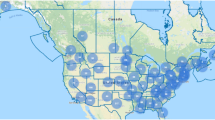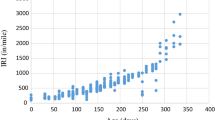Abstract
Roughness is a very important performance indicator in pavement maintenance management systems. The international rough index (IRI) of indicators was used as the core of roughness measuring of degree gradually in recent years domestically, but to predict a smooth degree of indicators the method is set up differently as there is a different prediction indicator because the theoretical foundation is different. This research bases its measurement data on the porous asphalt pavement of national highway number 3. We predicts the deterioration of IRI by different ways, including grey forecast, multiple regression, genetic programming. The result of this research found that there are better results in genetic programming method prediction than roughness index foundation method. The reason that it accords with the best prediction result is that heredity can carry on the change to plan in the parameter.
Preview
Unable to display preview. Download preview PDF.
Similar content being viewed by others
References
Mrawira, D.M., Wile, C.S.: Roughness Progression Model Based on Historical Data: Case Study from New Brunswick. In: Proceeding of Transportation Research Board, Washington, D.C. (2001)
Yu, C.H.: Dynamic Analysis of the Pavement Performance, Graduate Program of the Department of Civil Engineering. National Taiwan University, Taipei (1998)
Hung, C.T.: The Study on Establishing the Present Serviceability Index and Predictive Model of Flexible Pavement, Graduate Program of the Department of Civil Engineering. National Central University, Chungli (2000)
Shih, K.C., Wu, K.W., Huang, Y.P.: Grey Information Relation Theory. Chuanhua Book, Taipei (1994)
Jiang, Z.T.: Design and Application of Fuzzy-Logic-Based Grey Prediction Controller, Graduate Program of the Department of Industrial Technology Education. National Normal University, Taipei (1994)
Deng, J.L.: Grey Control System. Huazhong University of Science and Technology Press, Wuhan (1988)
Deng, J.L., Kuo, H., Wen, K.L., Chang, T.CH., Chang, W.CH.: Gray Forecast Model and Applications. Gau Lih Book, Taipei (1999)
Cramer, N.L.: A Representation for the Adaptive Generation of Simple Sequential Programs. In: John, J. (ed.) Proceedings of an International Conference on Genetic Algorithms and the Applications, Grefenstette, CMU (1985)
Koza, J.R.: Genetic Programming: On the Programming of Computers by Means of Natural Selection. MIT Press, Cambridge (1992)
Lin, F.Y.: An Analysis on the Deformation Property of Porous Asphalt Concrete, Graduate Program of the Department of Civil Engineering, Tamkang University (2000)
Drainage Pavement Technical Guidelines, Japan Road Association, Tokyo, Japan (1996)
Author information
Authors and Affiliations
Editor information
Editors and Affiliations
Rights and permissions
Copyright information
© 2008 Springer-Verlag Berlin Heidelberg
About this paper
Cite this paper
Chen, CT., Hung, CT., Chou, CC., Chiang, Z., Lin, JD. (2008). The Predicted Model of International Roughness Index for Drainage Asphalt Pavement. In: Huang, DS., Wunsch, D.C., Levine, D.S., Jo, KH. (eds) Advanced Intelligent Computing Theories and Applications. With Aspects of Theoretical and Methodological Issues. ICIC 2008. Lecture Notes in Computer Science, vol 5226. Springer, Berlin, Heidelberg. https://doi.org/10.1007/978-3-540-87442-3_115
Download citation
DOI: https://doi.org/10.1007/978-3-540-87442-3_115
Publisher Name: Springer, Berlin, Heidelberg
Print ISBN: 978-3-540-87440-9
Online ISBN: 978-3-540-87442-3
eBook Packages: Computer ScienceComputer Science (R0)




